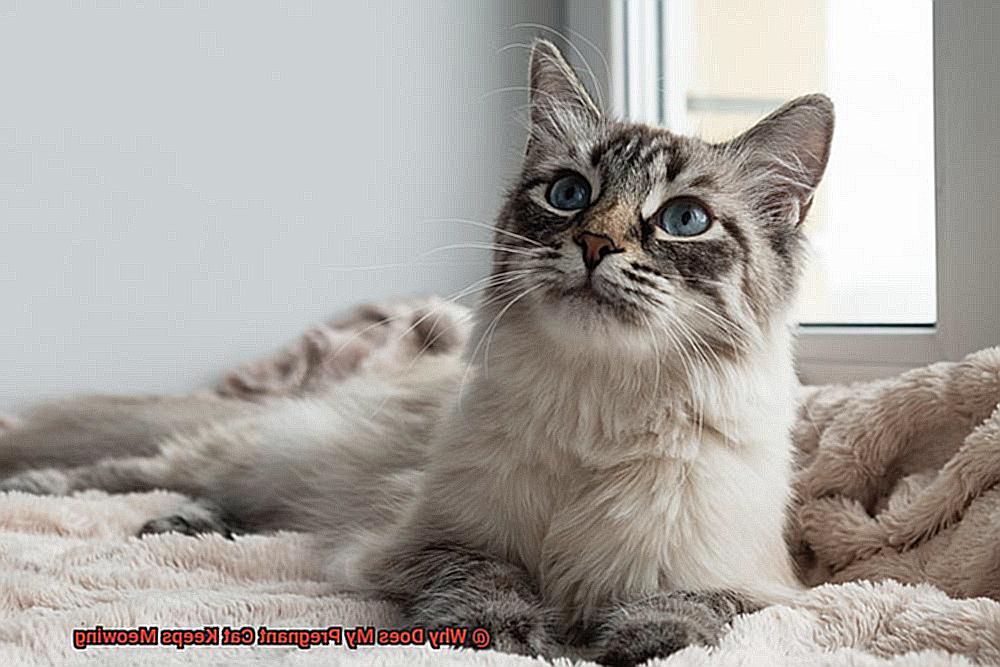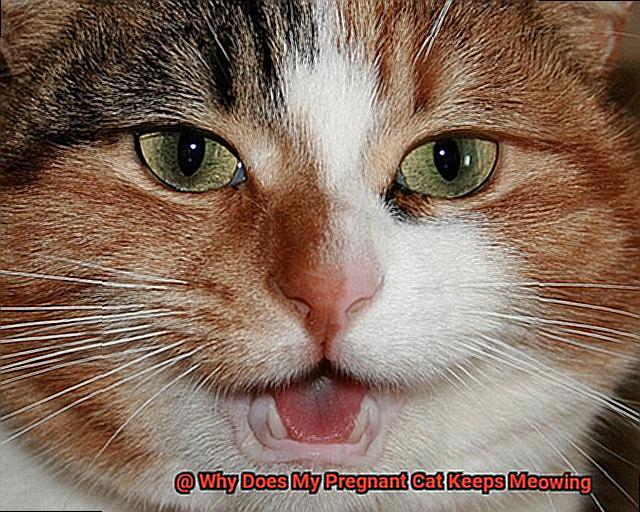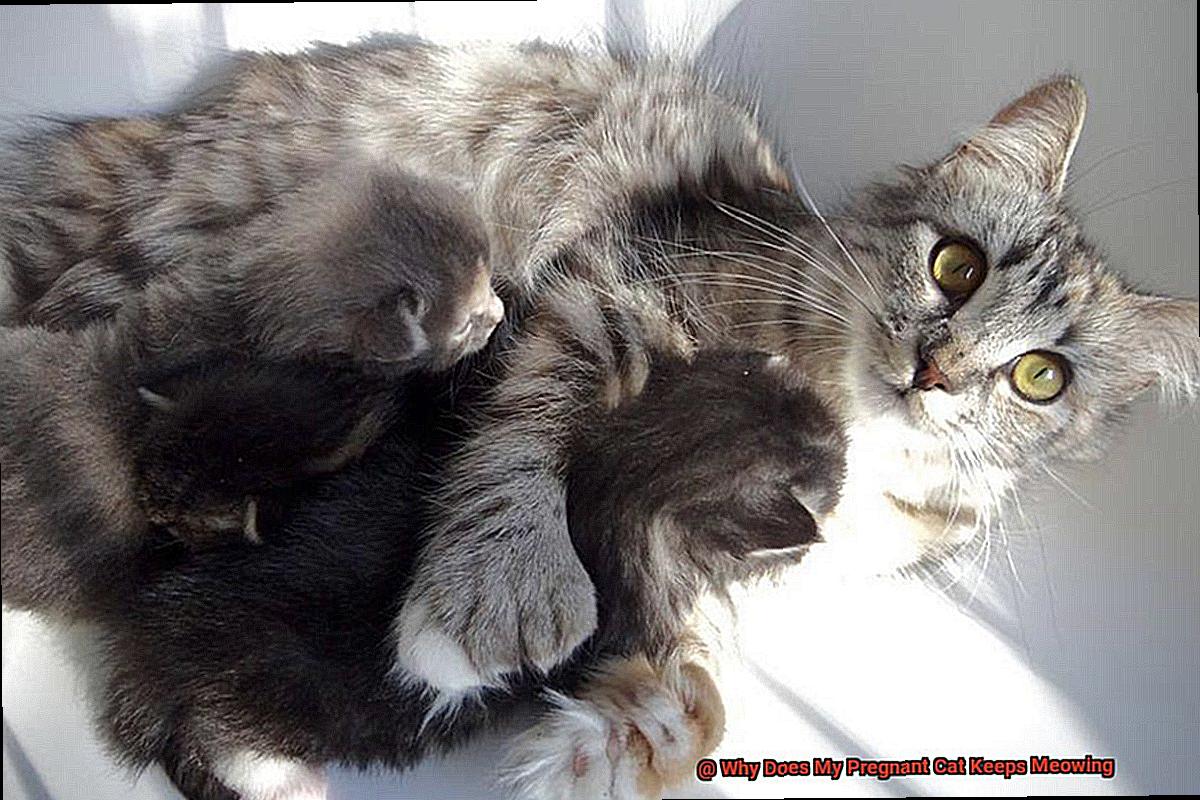You may have noticed your pregnant cat meowing more often than usual, and you’re probably wondering why. As a cat parent, it’s important to understand the reasons behind this behavior. Is she trying to tell you something? Is she feeling sick or uncomfortable? Or is it just her hormones acting up?
Don’t worry, because in this blog post, we’ll dive into the possible reasons why your pregnant cat is meowing excessively.
Firstly, pregnancy can cause significant changes in your cat’s body, which may lead to her feeling ill or hungry. This discomfort could prompt her to meow for attention or food. Additionally, if she’s a first-time mother-to-be, she may feel anxious about the upcoming delivery and use meowing as a coping mechanism.

Secondly, excessive meowing could be an indication that your pregnant cat is going into labor soon. She may be trying to communicate that she needs assistance during delivery or that it’s time to prepare for the arrival of kittens.
Lastly, your pregnant cat might simply crave your attention and affection more than usual. Pregnancy can make cats more needy and affectionate towards their owners. So if you find your furry friend constantly seeking out your company and cuddles, it could just be her way of saying “I love you.”
Now that we’ve covered the basics let’s delve deeper into each reason so that you can better understand what’s going on with your feline companion. So sit back with a cup of tea and get ready to learn more about why your pregnant cat keeps meowing.

Signs of Hunger in Pregnant Cats
Pregnant cats require more calories to support their growing fetuses, which means that they may display unique signs of hunger.
One of the most noticeable signs of hunger in pregnant cats is increased vocalization. Your cat will begin to meow more frequently and loudly than usual, particularly when they see or smell food. They may even become more demanding for food and follow you around or paw at their food bowls to indicate their hunger.
Another sign of hunger in pregnant cats is weight loss. If your cat isn’t getting enough food, she will start to lose weight, which can be harmful to both the mother and her kittens. It’s essential to keep a close eye on your pregnant cat’s weight and adjust her diet accordingly.
Lethargy or weakness is another symptom of hunger in pregnant cats. If they are not getting enough calories, they may become less active and spend more time sleeping or sitting in one place. This could indicate that they are conserving energy due to a lack of food.
In addition to these symptoms, pregnant cats may also exhibit signs of anxiety or stress if they are not receiving enough food. They may become more irritable and agitated, and may even start to exhibit destructive behavior such as scratching furniture or carpeting.
To ensure a healthy pregnancy, it’s vital that your pregnant cat receives proper nutrition. Keeping track of her diet closely and ensuring that she is getting enough calories to fuel her growing fetuses is essential. If you notice any signs of hunger or weight loss, consult with your veterinarian about adjusting her diet or providing additional nutritional supplements as needed.
In conclusion, recognizing the signs of hunger in pregnant cats is crucial for their well-being and the health of their litter. Keep an eye out for increased vocalization, weight loss, lethargy, and signs of anxiety or stress.
Symptoms of Discomfort and Pain in Pregnant Cats
However, just like human mothers, pregnant cats may experience discomfort and pain. To ensure your cat’s well-being, it’s crucial to keep an eye out for the symptoms of discomfort and pain in pregnant cats.
Restlessness is one of the most common signs of anxiety in pregnant cats. You may notice your kitty pacing around in search of a cozy spot to rest or sleep in. This could be due to the extra weight and strain on her body.
Another warning sign to look for is a loss of appetite. Pregnant cats may lose their desire to eat due to nausea or abdominal pain. If you notice that your cat isn’t eating or drinking as much as usual, it’s crucial to consult with your veterinarian.
When using the litter box, pregnant cats may also meow excessively or cry out in pain, which could be an indication of a urinary tract infection or constipation. If you observe any of these symptoms, it’s vital to seek medical attention as soon as possible.
Lastly, pregnant cats may reveal signs of discomfort by incessantly licking or biting certain areas of their body. This could signify soreness or tenderness in those regions.
In conclusion, keeping a close watch on your cat’s behavior and being aware of these symptoms can help ensure a healthy and comfortable pregnancy. If you notice anything odd or concerning, don’t hesitate to contact your veterinarian.
Stress and Anxiety in Pregnant Cats
Just like humans, cats experience stress and anxiety during pregnancy, and there are a variety of factors that can contribute to it.
One common cause of stress in pregnant cats is changes in their environment. Moving to a new home, introducing new pets or people, or even rearranging furniture can be stressful for a cat. Pregnant cats may become anxious if they feel their territory is threatened or if they don’t feel safe in their surroundings. Excessive meowing, hiding, or other signs of distress may be observed.

Hormonal changes during pregnancy can also lead to stress and anxiety in cats. These changes can cause cats to become more sensitive to their surroundings and more easily stressed. Additionally, hormonal imbalances can cause mood swings, irritability, and increased vocalization.
Physical discomfort can also cause pregnant cats to meow excessively. As the pregnancy progresses, the cat’s body undergoes significant changes which can be uncomfortable or even painful. This can cause the cat to meow excessively as a way of expressing discomfort.
It’s important for cat owners to be aware of the signs of stress and anxiety in pregnant cats, such as excessive meowing, hiding, decreased appetite, and aggression. If a cat is exhibiting these symptoms, it’s important to take steps to reduce stress and anxiety in order to ensure a healthy pregnancy. This may include providing a quiet and secure environment, offering plenty of opportunities for play and exercise, and providing comfort and support during this time of transition.
In conclusion, understanding the causes of stress and anxiety in pregnant cats is vital to ensure that your furry friend has a happy and healthy pregnancy. By keeping an eye out for warning signs and providing a safe and secure environment with ample opportunities for play and exercise, you can help your cat bring her kittens into the world in the best way possible.
Understanding Your Cat’s Behavior
Cats are mysterious creatures, and when they’re pregnant, their behavior can be even more intriguing. As a cat owner, it’s essential to understand and interpret your pregnant cat’s behavior. Meowing is one of the most common ways that pregnant cats communicate, but what does it mean?
Your cat might be trying to tell you something. She may be hungry, thirsty, or in need of attention. It’s vital to ensure that your pregnant cat has access to fresh water, food, and a comfortable place to rest. By providing these basic needs, you’ll minimize the chances of your cat meowing excessively.
Pregnancy can be challenging for cats, just as it is for humans. If your pregnant cat is experiencing pain or discomfort from her pregnancy, she may become restless and vocalize more. It’s crucial to monitor her behavior and seek veterinary care if necessary.
Stress and anxiety can also cause your pregnant cat to meow excessively. Changes in routine or environment can trigger anxiety in cats, leading them to become more vocal. Therefore, creating a calm and safe space for your pregnant cat and showering her with love and attention is essential.

Providing Proper Nutrition for Your Pregnant Cat
Congratulations. As a responsible pet parent, it’s essential to provide your furry friend with proper nutrition during this crucial time. Not only does it ensure your cat’s health, but it also plays a significant role in the growth and development of her unborn kittens.
Protein is a fundamental nutrient that pregnant cats require to support their kittens’ tissue and organ development. It’s like the building blocks of a house, with enough protein being crucial to make the structure strong and sturdy. So, make sure to include protein-rich foods like chicken, fish, turkey, and beef in your cat’s diet.
Did you know that fat can help the body absorb essential vitamins and minerals? However, too much fat can cause obesity in your cat. Think of it as fuel for a car – just enough to keep the engine running smoothly. A balanced diet is key.

For healthy bones and teeth in the kittens, specific vitamins and minerals like calcium, phosphorus, and vitamin D are essential. These nutrients act as the scaffolding of the building; without them, the structure won’t be stable or long-lived.
Feeding your pregnant cat small frequent meals throughout the day is recommended to ensure she receives adequate nutrition without overeating or becoming overweight. It’s like snacking on healthy treats throughout the day rather than having two large meals.
Seeking Medical Care for Your Pregnant Cat

Seeking medical attention for your pregnant cat is crucial to ensure that she and her kittens are healthy and happy. If you notice that your pregnant cat is meowing excessively, it could be a sign of pain or discomfort, and it is vital to address the issue as soon as possible.
Regular check-ups with a veterinarian are recommended to monitor your cat’s health and ensure that the pregnancy is progressing well. During these prenatal visits, the vet will track your cat’s weight gain, check for any signs of illness or infection, and perform ultrasounds to monitor the development of the kittens. Your vet may also recommend a special diet for your pregnant cat to ensure that she is getting all the necessary nutrients for both her and her kittens.
However, if you notice that your pregnant cat is screaming all the time, it could be a sign of a serious medical issue such as feline infectious peritonitis (FIP), toxoplasmosis, or pyometra. These conditions can be life-threatening for both the mother cat and her kittens. Therefore, it is crucial to seek veterinary attention immediately if you notice any changes in your cat’s behavior or health.
In addition to regular check-ups, it is essential to have an emergency plan in place in case your pregnant cat needs urgent medical attention. You should have contact information for a 24-hour emergency veterinary clinic and know how to recognize signs of distress in your cat.
Creating a Safe and Comfortable Environment for Your Cat
A happy and healthy mother leads to happy and healthy kittens.
Your pregnant cat may become more vocal than usual due to hormonal changes in her body. To help her feel relaxed, it’s essential to create a peaceful and quiet space for her to rest in. Make sure the room is well-ventilated, with a comfortable bed or nesting area lined with soft blankets or towels.
Safety is paramount, so ensure that the area is free from potential hazards that could harm your cat or her developing kittens. Remove anything sharp or toxic, and ensure that electrical cords are out of reach.
During pregnancy, your cat requires a balanced diet with additional nutrients and calories to support her growing kittens. Consult with your veterinarian about the best type of food to feed your cat during this time. Fresh water should always be available and changed frequently.
Spending quality time with your pregnant cat can help alleviate any stress or anxiety she may be experiencing. Grooming, playing, and cuddling are all excellent ways to bond with your furry friend and promote relaxation.
So, creating a safe and comfortable environment for your pregnant cat requires setting up a peaceful space, providing a cozy resting area, removing any hazards, providing a balanced diet with fresh water, and spending quality time together.
yggLlr6dQ8E” >
Showing Love and Attention to Your Cat During Pregnancy
During this time, your feline friend may become more vocal and restless due to hormonal changes, discomfort, and anxiety. But fear not. We’ve got some tips to help you show your furry companion the love and care she deserves during her pregnancy.
First things first – create a cozy and secure environment for your pregnant cat. Providing her with a quiet and secluded space where she can rest undisturbed is essential. A cozy nesting box filled with soft blankets or towels will make her feel comfortable and safe.
Next up, nutrition is key. Pregnant cats require a high-quality, balanced diet to support their growing fetuses. Consult with your veterinarian to determine the appropriate diet for your cat’s specific needs. Fresh water should also be readily available at all times.
Regular veterinary check-ups are crucial to ensure proper prenatal care for your kitty. Your vet can monitor her health and advise you on any necessary vaccinations or medications.
Now for the fun part – giving your pregnant cat plenty of affection and attention. Spend quality time with her, playing with toys or simply cuddling on the couch. This will not only ease her anxiety but also strengthen your bond with your furry friend.
Overall, showing love and attention to your pregnant cat is essential for her health and well-being. By providing a comfortable environment, proper nutrition, regular veterinary care, and plenty of affection, you can help ensure a safe and happy pregnancy for your feline companion.
Also Read: Why Is My Pregnant Cat Meowing So Much?
Conclusion
In conclusion, your pregnant cat’s excessive meowing may be due to several reasons caused by the significant changes occurring in her body. She may be experiencing discomfort, anxiety, hunger or thirst, and require assistance. Additionally, she may require attention and affection more than usual, or she might be getting ready for labor.
It is crucial to understand the signs of hunger, pain, and anxiety in pregnant cats to ensure their safety and wellbeing. A balanced diet high in protein and essential vitamins and minerals is vital for growth and development. Regular veterinary check-ups are also essential to monitor their health and receive appropriate prenatal care.
Creating a safe environment with a cozy nesting area free of potential hazards can help reduce anxiety while promoting relaxation.
Spending quality time together through playtime, grooming sessions, or cuddling can strengthen your bond while also relieving any anxiety or sadness your furry friend may be feeling.







